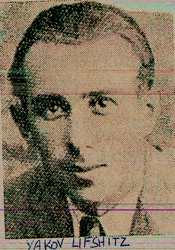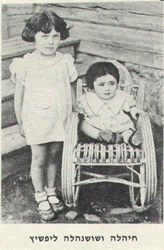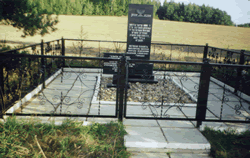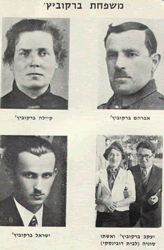The Story of
Yakov and Fruma nee Shulman Lifshitz
By Binyamin Shafir (Shishko)
Translated from Vol.Y.Book page 486, by M. Porat
Yakov Lifshitz born in Rakow in 1907
 Yakov Lifshitz was born in Rakov on April of 1907. His father had past
away, when Yakov was only ten years old. Despite the family financial
difficulties Yakovs' mother was able to send him to study in a Yeshiva.
Yakov studied the Torah very proficiently but preferred general
secular studies. He left the Yeshiva after studying there for a couple
of years and continued his education at a Russian School in Rakov.
Yakov Lifshitz was born in Rakov on April of 1907. His father had past
away, when Yakov was only ten years old. Despite the family financial
difficulties Yakovs' mother was able to send him to study in a Yeshiva.
Yakov studied the Torah very proficiently but preferred general
secular studies. He left the Yeshiva after studying there for a couple
of years and continued his education at a Russian School in Rakov.
In 1925 Yakov was admitted at the Vilna Technical School. Since early
childhood he was attracted to Mathematics and the exact sciences. Is great
interest in the science field helped him to do well in the
Technical High School. After 2 years of study in Vilna he transfered to
the teachers Seminary that was directed by Shmuel Tsharno. After graduating
Yakov was nominated as the head of the Rakov Tarbut School. After one
year of work there he left for Volozhin, where he was received to head
the town Tarbut Primary School (1931)., together with school managing
he taught Mathematics and physics, he taught both subjects in Hebrew.
Translator's note: Each Friday Yakov would gather all the students and
read before them chapters from Sholom Aleykhem in Yiddish (Sholom Aleykhem
nee Sholem Rabinovitsh is famous for many works such as the Tevye stories-on
which Fiddler on the Roof was Based-a novel Stempenyu about a Jewish klezmer)
I mostly remember "Yossi peysi dem Khazn's" - the
wonderful story about the Russian Jews exodus to the New World. We were
enchanted by the Yiddish writer's stories read by our teacher in our mother
language. In Tarbut Schools' we did not learn Yiddish at all. Another
event I remember is that with my ten years old classmates, we were invited
to our teachers apartment on Vilna Street in Volozhin to
hear some classic music. The young couple Lifshits achieved
great honor in the childrens' eyes since they were able to buy a real,
one of the first gramophone's in the Shtetl with selection of Yiddish,
Hebrew and classical records. At this very memorable event
for me, event that took place some seventy years ago, we heard the famous
Chaikovski 's "Nut cracker".Â
Yakov since his youth was a devout Brit Tumpeldor ;"Beytar"
member (a Zionist revisionist movement), . Consistent in his opinions
Yakov defended ardently his revisionist points of view. In Volozhin he
found a wide scope to his public activities,
since the majority of the young and older people of Volozhin were at that
point of time Jabotinsky's supporters (Zev Jabotinsky 1880-1940 established
the Revisionist Zionists in 1925 and sponsored a more assertive and non-socialist
approach to the rebuilding of the Jewish homeland.)
His political opponents, as few as they were, made his public life difficult.
But we don't need to recall the long forgotten rivalries, as the sagest
of all did say "as you loved and hated, so also passed your jealousy".
Yakov did manage the School with talent and skill. during the first year
he established a four grades School, at the end in the 1938/39 year he
was managing a standard for that time primary school of seven grades.
For eight years Yakov stood as guard of the Hebrew education in Volozhin
until the Soviets came on September 1939. The new rulers took out his
creatve spirit. Yakov became deeply depressed. One day the Soviet Inspector
invited him for a meeting and instructed him to change the system from
the Hebrew language education for all subjects to a old style "Yiddish
school"
"per the parents demand" they claimed. They appointed a new
head of the school, a Jewish woman from the Soviet Union. The education
was stricktly programmed by the communist regime.
During the Soviet rule (1939- 1941)Yakov's spirit was burnt out. The Germans
invaded the area in 1941 and burnt out his soul and body.Pages about the
Holocaust,
By Fruma nee Shulman Lifshitz (Gapanovitsh).
Extracts from Yiz.Vol.Book p. 554, translated by M. Porat

Chayale was born in Volozhin on April 24, 1936
and Shoshanale Lifshitz born in Volozhin on July 7, 1933
and their father Yakov Lifshitz born in Rakow in 1907. They Perished in
Horodok
 After the Soviets occupied Volozhin, I returned to town from Ivianits
to teach Yiddish in the Hebrew School which was turned into a Yiddish
Primary School. In 1940/41 it became a Russian School, the Polish School
was turned to a Belorussian and the Polish Gymnasia (high school) to a
Russian High School.
After the Soviets occupied Volozhin, I returned to town from Ivianits
to teach Yiddish in the Hebrew School which was turned into a Yiddish
Primary School. In 1940/41 it became a Russian School, the Polish School
was turned to a Belorussian and the Polish Gymnasia (high school) to a
Russian High School.
In June 1941, at the eve of the German occupation, our family lived in
Leybe Berman's house. Our girls, Shoshanele and Hayele, both born in Volozhin,
we sent to my parents Alter and Fayga Shulman in Radoshkovitsh to pass
there the summer vacation. When the Nazis invaded our country, most of
the Soviet citizens who lived in Western Belarus ran away towards the
old border (Poland/ Soviet Union pre 1939). It was located right in the
outskirts of Radoshkovitsh, so my husband Yakov Lifshitz and I decieded
follow them. We took the way to Radoshkovitsh by foot to join my parents
and our daughters. We walked the entire night. Yakov became totally exhausted.
He stopped near the shtetl. I entered Radoshkovitsh alone. I only met
my father there.. My mother, sisters Bracha Shulman and Heina Berman and
her family, brother Israel Shulman and both my daughters had run away
to the hamlet Ordanka, which in normal days served as a summer resting
place. Radoshkovitsh was overcrowded by refugees from Poland and Lithuania.
Meanwhile, my husband recovered and arrived in town. We went to Ordanka,
from where we took our daughters, and continued with them on our way,
this time to Horodok, where Kheyne my elder sister lived.
I went twice to Volozhin. I took some of the clothing we left there to
exchange for food for the girls. I had the opportunity to secretly enter
the well guarded ghetto through Pinches the smith's workshop, which stood
near the Ghetto fence. I met there Sonia nee Dubinski Berkovitsh the daughter-in-law
of my aunt Keyle nee Shulman Berkovitsh. (sister of my father Alter).
They were astonished to see me. They were told that our entire family
had been killed.
I returned to Horodok, where mass-slaughter survivors from Volozhin and
Molodetshno just arrived. The Germans established a small concentration
work camp in Krasne, a crossroad junction midway between Molodetshno and
Radoshkovitsh, where able Jews from Volozhin, Mir, Lida, Novogrudok, Horodok
and other places were brought to maintain the railroad. My husband was
among them. When we separated I told him
"Our fate, mine and the girls is already determined, but you will
survive because you are regarded by the German as an efficient Jew"
-
So was our naïve opinion that working for the Germans will
keep us alive.
Every week some of the workers were allowed to go and bring food from
Horodok into the Krasne camp.
My little six year old daughter caught a bad scurvy gums illness. Mr Ratskin
the Judenrat head pitied me and arranged for Yakov a special permission
to come for a visit in the Horodok ghetto.
The bitter end of the Horodok ghetto arrived at the Shabbat that Yakov
spent with us, on July 11th 1942.
The Jews of Horodok and the vicinity did not sense the oncoming danger.
Their last sleep had been a sleep of the just.
Tha next morning at an early day break hour the Gestapo and its local
assistants intruded the Ghetto to take out the Jews.
five persons lodged at our home.
There were three hiding places. The hideout in which I concealed myself
with my little girls was discovered by the local police after the action
had already passed.
Mr. Ratskin, who was an elderly man, could not sustain the strangling
atmosphere in the small hidding place. We assumed that the action
had already passed and he was obliged to go outside. His going out had
provoked our hiding disclosure. They shot at Yakov and killed him on the
spot.
Afterward the murderers gathered all the Jews they found into the square
to be selected. Those they found able to work were transferred to the
Krasne camp. The old ones, invalids and children were sent to death. Among
the sentenced to die was also Fruma, Tsivya Tsart's mother. She had been
beat bestially, until she was covered with blood. The Germans enclosed
all of them inside a barn, shot them and burned it.
translator's note: (as Fruma told me this evening)
In this barn, 900 Horodok Jews found their tragic fate, along with Fruma
Lifshits's mother and her five grand kids, among them Shoshanele and Hayele
Lifshits. Yakov had been shot by one of their Horodok gentile neighbors.
Fruma witnessed her husband's death and had seen the bestial murderers
throw away his body.
Horodok Memorial
This memorial tombstone was erected in the 1990s near the site where 900
Horodok Jews were slaughtered. The plate on the left side (written in
Hebrew) is dedicated to Yakov Lifshitz and to his daughters Shoshanele
and Hayele.]
I was expelled to Krasne. Heyne my older sister was enclosed in the Krasne
Concentration camp, and my younger sister was placed with me in the Krasne
Ghetto. There I met people from Volozhin, among them Yosef Tabakhovitsh
and his wife Elke nee Shaker. Tsviya Tsart dwelled beside me and my sister
on the same planks. It was impossible to safeguard any hygienic conditions,
and a typhus epidemic broke out. As a result, the three of us were hospitalized
in a house outside the Ghetto. and we were "privileged" to be
inspected by the Gestapo physician. He used to oversee the patients and
determined by his cane movement which person to carry out to the "bath
house" i.e. for execution.
After my bout with typhus I was very feeble, so Father would endanger
himself by infiltrating from the camp into the ghetto to bring some grains
to fortify my body.
We were brought into the "bath house". The Germans examined
our withered bodies, but in some way our fate was not yet decided. Thanks
to my poor health status I was released from work for a few days. I used
this time to seek food for my hungry friends in the Krasne Ghetto.
Once I went to search for food with my brother in law and with Ester Rogovin
from Horodok. We went into a neighboring hamlet to gather some bread.
On the way back we came upon guards from the German Police. When they
passed near us we distinguished red bands on the Germans’
forearms, they were actually Russian partisans who had fought a
German unit the day before. They had won the battle, took the German uniforms
and wore them. We talked to them and they agreed to take Jews who would
carry arms and escape from the Krasne camp.
We returned to the Krasne camp and told everyone the exciting news. We
found ways to secretly buy rifles. One day a group of us was able to cross
the rails and join the partisans. They accepted us thanks to efforts made
by Eliezer Rogovin from Volozhin who was already with them.. A new unit
was founded by the name of "Staritski" within the Tshkalov brigade.
We met some Volozhiners in the forest, among them Feygele Perski, Hirshl
Rogovin, Ishayahu Lieberman and Pashe Perski wife of Simha Perski. I was
transferred into a partisans’ arms repair workshop after
a little time, where I worked until liberation on July 1944.
From time to time bitter fights occurred between German forces and partisan
units. The hardest German attacks broke out in July 1943. During this
period many partisan garrisons existed in the forests of Belarus. In order
to fight them, the Germans organized the Vlassov army, named after the
famous Russian traitor General Vlassov. Those units were composed of Belarus,
Kazakhs, Lithuanians, Ukrainians and other anti-Semites, all of them Hooligan-murderers.
Their first mission was the destruction of hamlets and farms near the
forests. The fate of the peasants in those hamlets was not much better
than that of the Jews. Many Christians ran to the forest. The Germans
opened an offensive on the forest, by heavy shooting, shelling and setting
fires. We were obliged to disperse. Kopl Kagan, Peshka Potashnik, her
brothers Yehuda and Yosef, my brother-in-law Berman, and I found a hideout
from which we got out just in time to meet the liberating Red Army.
Together with Peshka Potashnik we went through Krasne and Horodok into
Volozhin. I decided to leave the shtetl where each stone was impregnated
with blood of our dearest. The Soviet authorities proposed to me that
I teach in a Belarussian school. I refused as I was not ready to teach
youngsters who willingly assisted the Nazis in murdering Jews. I crossed
the border to Bialostock in Poland. But here in the Land of the Jews’
extermination camps, where the A.K.(Armiya Krayova), blood thirsty anti-Semites
awaited us, I could not stay.
I continued my wandering. From Bialostock I went to Lublin, and then with
a Zionist refugee organization, I went through Czechoslovakia to Hungary
and Romania. After the victory in 1945 we did not want to remain in a
Communist-ruled country behind the Iron Curtain. With the assistance of
the Zionist Organization, we crossed the border to Austria and then went
on to Italy. We passed a "Hakhshara" near Barry, and then we
waited to go to the Land of Israel. The British Government had refused
to deliver the certificates permitting our entry into our Land, so we
went to Israel with the Illegal Aliya. Along with 170 other Jewish refugees
many of them were sole holocaust survivors of entire families.
We boarded a small boat.
I arrived in Eretz Israel on September of 1945.
Shulman, Alter and his wife; Fayga - FRUMA'S PARENTS
their daughters: Heina (Berman) and Bracha - FRUMA'S SISTERS
their sons: Hanoch (killed serving in the Polish army) and Israel
Shulman - FRUMA'S BROTHERS all perished in the holocaust
Fruma had a brother ITSKHOK. He was in the States during the war.
I talked with Fruma nee Shulman. Fruma was born in Radoshkovichi about
93 years ago. She told me that when she was growing up in Radoshkovichi
there were three Shulman families in Radoshkovichi and she is related
to two of them as both her mother and her father were born Shulmans. Her
father was Alter Shulman and her mother was the daughter of Shaya
Shulman. Her mother had uncles and brothers in Pennsylvania. There were
two brothers and two sisters of her mother, one that she met in New York
was RASHA FIDELHARP (?). She also said she had relatives in Miami.

Clockwise: Keyla Berkovitsh nee Shulman (fruma's aunt) ; Avrom Berkovitsh;
Their son Yakov Berkovitsh with his wife Sonia (born Dubinski) ;
Their second son Isroel Berkovitsh